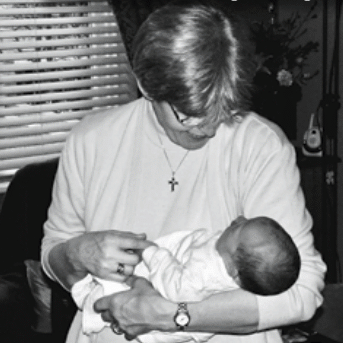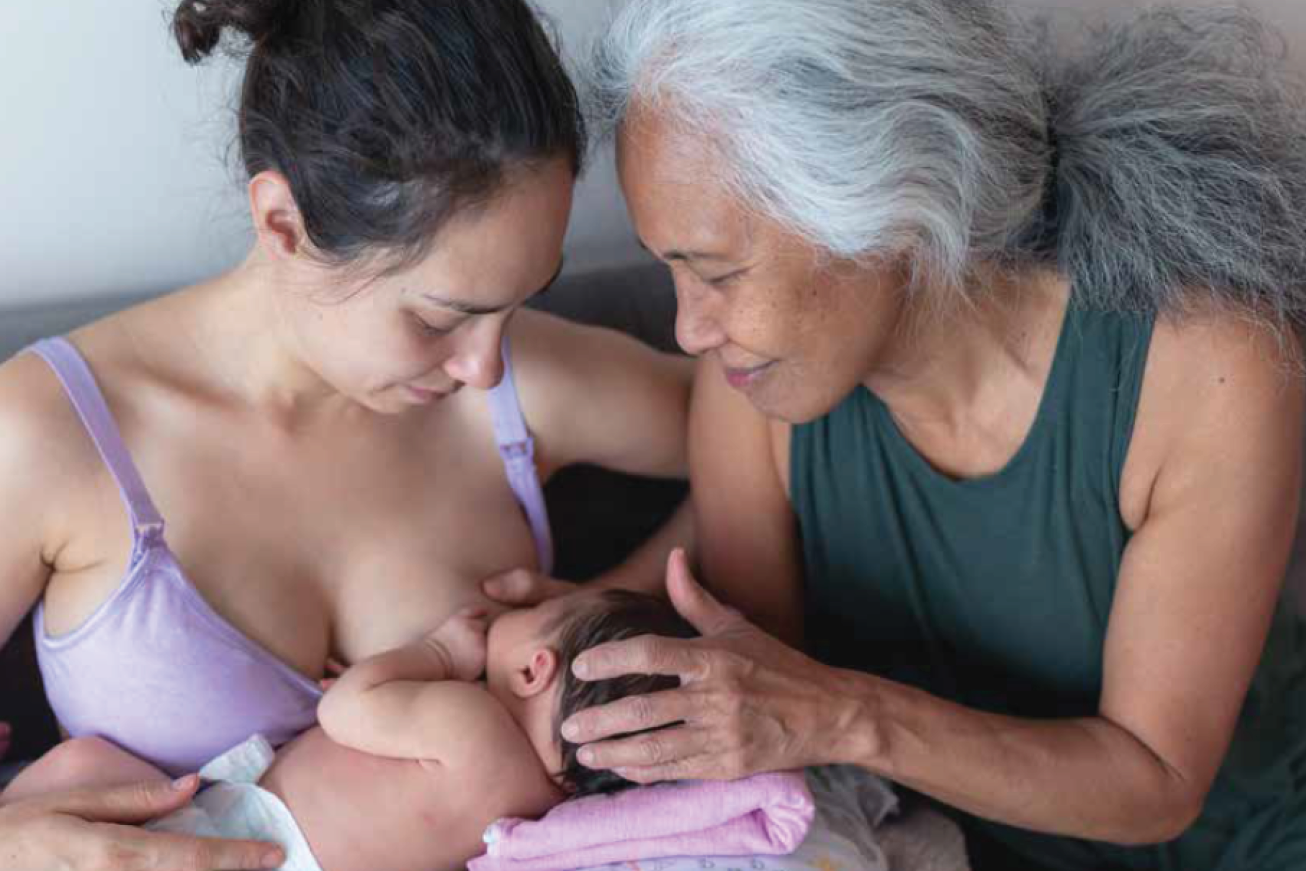
A new baby on the way? Congratulations! Of course you are going to want the very best for this new member of your family, as well as for your grandchild’s parents. No matter whether you are becoming a grandparent, step-grandparent, great-grandparent, great-aunt or -uncle for the first or the fourth time, you will be feeling very proud and excited about having an important role to play in this little person’s life.
You might know the baby is going to be breastfed. Perhaps breastfeeding isn’t something you know much about, or maybe you didn’t breastfeed your own children. It’s likely that lots of things have changed since you had your babies. Perhaps they were born in a different country, your children may have a different lifestyle to your own, perhaps they have partners from different cultures, religious backgrounds or speak other languages – it can be a lot to take in! And now there is a new baby too, you might find you have even more different ideas!
After the baby is born
In the first few days after birth, a baby will want to breastfeed every time they’re awake. At this point in time, a mother may only have time to feed the baby, eat and sleep. This is normal and a mum and her baby will want to spend all their time together. The mother needs to be close to her baby at all times in order to feed often, and the hormones of a breastfeeding mother means there is an intense emotional and physical connection between mother and baby. By meeting her baby’s needs immediately, a mother helps her baby to develop a secure attachment with her, which helps baby to grow into a confident child.
Why breastfeed?
Breast milk is normal – human milk is made for human babies, formula milk is artificial.
Although formula milk is adequate for babies, it is not equal to breast milk. Breast milk contains many things that cannot be made in a factory: living cells, antibodies, hormones, active enzymes. Breast milk changes to meet the growing needs of the baby and the environment the baby is in. If the baby or mother is exposed to an illness, then the mother’s breast milk will contain antibodies to help protect the baby. Breast milk changes throughout the day and contains flavours from the mother’s diet. Formula just can’t do these things – it is a static product.
Human babies are born with immature brains that need to grow rapidly, whilst physical growth is much slower. Breast milk contains all the ingredients necessary to achieve this. Cow’s milk, on the other hand, is designed for the fast physical and muscular growth required by calves.
Even in the modern western world we live in, babies who are fed formula milk are more likely to be hospitalised due to illnesses such as gastroenteritis, and are at higher risk of developing diabetes, cancers, obesity and other modern diseases as children and adults.
Baby-led attachment and skin-to-skin
In recent years, research has shown that babies have an inborn ability to move and attach themselves to their mother’s breast – baby-led attachment. Whether the baby is born in hospital or at home, it is likely that the baby will be placed on the mother’s bare chest immediately or soon after birth, and allowed to spend some time resting and getting to know his mother – this is called skin-to-skin and helps to triggers the baby’s natural reflex to feed.
You will often see baby bobbing their head around, falling, crawling or even throwing themselves towards their mother’s breast. The baby uses their sense of smell and their cheeks to help find their mother’s breast. These instincts remain strong for several months after the baby is born.
The baby’s sense of smell is the most developed sense at birth, so it is important for baby and parents to stay close in the first 24–48 hours to get to know each other – the smells of other people can be confusing at this time, and you may find that for the first day or two, new parents don’t want anyone else to hold their baby… including you.
This may feel frustrating and unnecessary to you as a grandparent but try to remember it is only for a day or two and then you have a whole lifetime of cuddles and fun to enjoy. Perhaps you can stay close by and give the new mother and father a hug while they hold their baby until the time is right for you to have that precious, first cuddle.
Feeding on demand
New breastfed babies often seem to be feeding often, with little thought of routine or spacing feeds. This could be quite different to the way you were shown to feed your baby, especially if formula was part of your baby’s diet. In the early days, a mother’s milk supply is mainly controlled by hormones. Over a few weeks this gradually switches to being controlled by the breasts. The process of supply is managed based on how much milk is removed from the breast and how often. It’s important to feed to meet the baby’s demand, as this allows the breasts to work to produce milk to match each individual baby’s hunger and feeding pattern.
As baby grows, they may go through phases of feeding more often for a day or two. This is the baby’s way of telling the supply process that they are hungrier and need more milk to meet their growing needs. The breasts respond to the increased demand by increasing the quantity of milk being made. When you think of how this supply and demand process works, it’s easy to see why many women in the past found a four-hourly feeding routine could lead to milk supply not being adequate to meet their baby’s needs.
If your grandchild seems to need feeding often, you can help support your daughter-in-law by encouraging her to trust her body’s ability to nurture her baby and feed as often as she needs to. You might be able to help by putting on a load of washing, cooking meals or helping with older siblings.
Sleep is precious
Having a new baby is very tiring, as you will remember yourself. All babies wake at night and often continue to do so for several months or longer. Breastfeeding at night helps maintain milk supply, helps with bonding and can be a time for quiet, peaceful breastfeeds. Hormones produced in breast milk and by the mother herself help baby and mum get back to sleep more quickly after breastfeeding. Encouraging a new mum to sleep or rest during the day when her baby naps is a good way for new mums to catch up on a little rest in the early days and weeks.
This can be hard for many new mothers to do, but if you are able to help with keeping the house clean and tidy, doing some shopping and cooking, then it can be easier for your daughter (or daughter-in-law) to rest when her baby does.
Bottles/pacifiers
The action of breastfeeding is quite different to the sucking action when using a bottle or pacifier; some babies are confused by the different sucking action. It is better for the baby and mum if breastfeeding is well established before considering giving bottles or other teats. Once the baby is breastfeeding well (usually after a couple of months), then it may be possible to give the baby a bottle of expressed breast milk.
If a baby is encouraged to suck a pacifier to settle it can lead to less milk being taken from the breasts, leading to a reduction in milk supply. Many mothers choose to soothe and comfort their baby by breastfeeding rather than with pacifiers. Being able to offer the breast as a way of comforting and soothing an upset baby or child is a wonderful parenting tool that many mothers come to cherish as time goes on.
Feeding in public
These days women can feed their baby pretty much anywhere they want to. Once a new mum has had a bit of practice feeding her baby, it is quite possible to feed comfortably while out and about, however, it can be a daunting prospect the first few times! If the new mum feels she has your support, then she will feel comfortable feeding in front of you and other family members. Once your daughter (or daughter-in-law) feels ready to go out with her baby, you could offer to go with her to give her some moral support while breastfeeding in public.
Mothers usually notice as soon as their baby starts to show feeding cues and are able to start feeding before their baby becomes upset. This means that most of the time people only notice a mum and baby snuggled up together – often they don’t even realise the mother is breastfeeding.
There are many things that grandparents or other close family members can do to support breastfeeding mothers:
- Offer to help with the other children – read them a story or play with them.
- Help around the house – do the dishes or the grocery shopping.
- Hang out the washing, do some cleaning or make the school lunches.
- If mum is finding breastfeeding hard going, encourage her.
Breastfeeding may not be easy for every mother at first, but it’s worth the effort!
Help mum to get the rest she needs by offering to help with the baby, but know that some mums prefer to keep their baby close at all times. You could offer to bath baby or burp them after a feed – and don’t forget to help with nappy changing!
Aim to make at least the first ten days after the birth a ‘babymoon’ for the new mother – free from cooking, cleaning and childcare, unless she chooses.
New mums and the baby blues
Many new mums have what is often called ‘the baby blues’. It’s quite normal for new mums to feel emotional and be more sensitive than usual in the early days, but it does usually pass within a couple of weeks. However, if you are concerned that a new mum is struggling more than usual, or you have concerns about postnatal depression, talk to her and encourage her to discuss it with her midwife, well-child nurse or GP. Getting help early is really useful in these situations.
For more information
Find out more about breast-feeding from your local La Leche League group – they are just as happy to talk to grandparents (and other relatives) as well as mums of new babies.
To find your local group, visit: www.lalecheleague.org.nz







